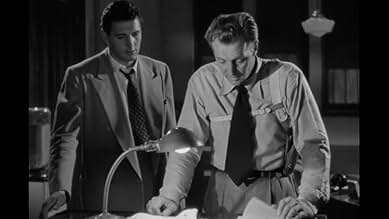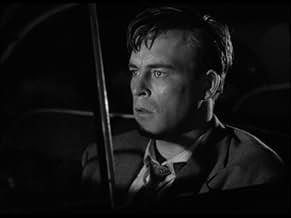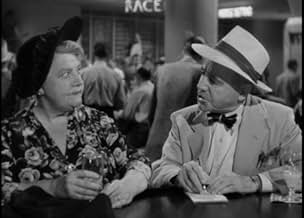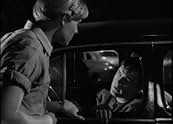NOTE IMDb
6,6/10
1,1 k
MA NOTE
Ajouter une intrigue dans votre langueA paroled convict is framed for murder and must clear himself before the police catch him.A paroled convict is framed for murder and must clear himself before the police catch him.A paroled convict is framed for murder and must clear himself before the police catch him.
- Réalisation
- Scénario
- Casting principal
Dan Ferniel
- Gene
- (as Daniel Ferniel)
Rock Hudson
- Detective
- (as Roc Hudson)
Anne P. Kramer
- Telegraph Clerk
- (as Ann Pearce)
Bobby Barber
- Tony
- (non crédité)
Marjorie Bennett
- Wife at Reno Bar
- (non crédité)
Edward Clark
- Drugstore Clerk
- (non crédité)
James Conaty
- Gambler
- (non crédité)
Sayre Dearing
- Gambler
- (non crédité)
Robert Easton
- Fisher - Parking Lot Valet
- (non crédité)
George Eldredge
- Pop
- (non crédité)
Avis à la une
Scott Brady meets Peggy Dow at the Reno gambling spot run by John Russell. He helps her win $120 at the craps table. They are seated next to each other on the flight to Chicago. He tells her he's going to propose to Dorothy Hart. He doesn't notice, but she looks disappointed.
In Chicago, Miss Hart is enthusiastic, but she warns him her uncle will object. He's the head of the Syndicate and he doesn't want her wedding anyone from the criminal world. Brady says he'll talk to him, but on the way he is grabbed, shot and moved. When he wakes, he discovers her uncle has been killed and he's been identified as the killer. The cops are on to his old friends. His only possible help is Miss Dow and his old friend Bruce Bennett, now a Chicago detective.
William Castle directed this with a lot of Chicago location shooting. It's more a Black Mask sort of story than a straight noir, with the lighting touches limited to the El system and the final couple of minutes. The movie is directed for speed and efficiency -- a Universal programmer, but with a decent number of red herrings and good performances (particularly by Bennett) until the murk begins to clear for the viewer about two-thirds of the way through.
Observant fans will want to keep an eye out for Rock Hudson in his first credited role.
In Chicago, Miss Hart is enthusiastic, but she warns him her uncle will object. He's the head of the Syndicate and he doesn't want her wedding anyone from the criminal world. Brady says he'll talk to him, but on the way he is grabbed, shot and moved. When he wakes, he discovers her uncle has been killed and he's been identified as the killer. The cops are on to his old friends. His only possible help is Miss Dow and his old friend Bruce Bennett, now a Chicago detective.
William Castle directed this with a lot of Chicago location shooting. It's more a Black Mask sort of story than a straight noir, with the lighting touches limited to the El system and the final couple of minutes. The movie is directed for speed and efficiency -- a Universal programmer, but with a decent number of red herrings and good performances (particularly by Bennett) until the murk begins to clear for the viewer about two-thirds of the way through.
Observant fans will want to keep an eye out for Rock Hudson in his first credited role.
Today ,William Castle is known as the man who bought Ira Levin's "Rosemary's baby " rights and produced one of the best horror movies of all time.
"Undertow" has a quite derivative screenplay but the director made the best of it and any film noir buff can give it a chance :it thoroughly deserves it.It features at least one unforgettable scene: the chase in the long corridor which gives you goose flesh.Of the two female leads,I prefer Dorothy Hart to the rather bland Peggy Dow.
In the 1968 movie Castle produced ,there was a corridor which played a prominent part too.
"Undertow" has a quite derivative screenplay but the director made the best of it and any film noir buff can give it a chance :it thoroughly deserves it.It features at least one unforgettable scene: the chase in the long corridor which gives you goose flesh.Of the two female leads,I prefer Dorothy Hart to the rather bland Peggy Dow.
In the 1968 movie Castle produced ,there was a corridor which played a prominent part too.
There's more to Undertow than the first screen credit of young `Roc' Hudson (in fact his tiny role as a police detective barely registers). It's one of a handful of noirs that William Castle directed before turning his attention to, and making his name in, gimmicky schlock. While none of them is so good as his first When Strangers Marry, with Robert Mitchum and Kim Hunter they're more than passable. As is Undertow.
Scott Brady looks like Lawrence Tierney's kid brother (which in fact he was). In Reno after a stint at a mountain lodge he wants to buy and run, he bumps into an old pal from mobbed-up Chicago (John Russell). They compare the diamond rings they've bought for their respective fiancees, though that doesn't stop Brady from flirting with a girl (Peggy Dow) he met in a casino and shares a flight home with. Since the police meet him at the plane, any extracurricular romance comes to naught, so Brady dutifully hooks up with his intended (Dorothy Hart). Next thing, he's taken for a ride and framed for the murder of unseen crime boss Big Jim, who happens to be Hart's uncle. Trying to clear himself while on the lam, he enlists Dow's help; he also happens to stumble onto the fact that his fiancee and Russell's are the same woman....
Undertow is pure story, competently enough executed if devoid of anything particular to lodge in the memory. It preserves evidence of why Brady stayed in his brother's imposing shadow, and leads one to wonder why Hart made so few movies (though, of her handful of credits, roughly half are noirs). While not an essential title in the noir cycle by any means, Undertow was one of the hundreds of titles that went into making it a cycle, and far from the weakest of them.
Scott Brady looks like Lawrence Tierney's kid brother (which in fact he was). In Reno after a stint at a mountain lodge he wants to buy and run, he bumps into an old pal from mobbed-up Chicago (John Russell). They compare the diamond rings they've bought for their respective fiancees, though that doesn't stop Brady from flirting with a girl (Peggy Dow) he met in a casino and shares a flight home with. Since the police meet him at the plane, any extracurricular romance comes to naught, so Brady dutifully hooks up with his intended (Dorothy Hart). Next thing, he's taken for a ride and framed for the murder of unseen crime boss Big Jim, who happens to be Hart's uncle. Trying to clear himself while on the lam, he enlists Dow's help; he also happens to stumble onto the fact that his fiancee and Russell's are the same woman....
Undertow is pure story, competently enough executed if devoid of anything particular to lodge in the memory. It preserves evidence of why Brady stayed in his brother's imposing shadow, and leads one to wonder why Hart made so few movies (though, of her handful of credits, roughly half are noirs). While not an essential title in the noir cycle by any means, Undertow was one of the hundreds of titles that went into making it a cycle, and far from the weakest of them.
Having returned to Chicago, Tony Reagan (Scott Brady) is accused of murdering a wealthy, powerful man who happens to be his fiance's uncle. Injured and with the police hot on his trail, Reagan has few places to turn. He eventually seeks the assistance of a woman he hardly knows. He met her the previous day on the flight to Chicago. With her help, Reagan's out to clear his name.
Undertow is a neat little film noir that, until last night, I had never heard of. I was shocked at how much I enjoyed it. The story has a lot of suspense that builds throughout. There may have been a few predictable bits in the plot (like the murderer's ID) and some big coincidences (like a friendly cop who agrees to help), but the journey is so much fun it hardly mattered. Director William Castle (yes, that William Castle) proves that he could do more than churn out sensational schlock. His pacing in Undertow is about perfect. The film also looks phenomenal. Cinematographer Irving Glassberg lensed a movie that looks far better than it has a right to. But, then again, I seem to say that about a lot of the Universal B picture output from the 40s. Finally, I enjoyed the exterior 40s-era footage. Whether it was the airport, the plane, or downtown Chicago, it was awesome stuff.
I have no complaints as far as the acting goes. Generally, I'm not much of a fan of Scott Brady. There's just something about him that puts me off. Here, however, I thought his performance was more than adequate. As for co-star Peggy Dow - what a revelation! Considering this was her first film role, she was amazing. Dow plays the sweet, innocent, cute, trusting, fresh-faced, all-American girl about as well as anyone I've ever seen. Looking over her filmography, I'm saddened to see she only made nine films. I'm going to make it my mission to see as many of these as I can. The rest of the supporting cast - John Russell, Dorothy Hart, Bruce Bennett - are equally strong. Finally, the film features a blink-and-you'll-miss-it moment from a fresh-faced Roc (with no k) Hudson.
Overall, a nice little film that I'm happy to have stumbled upon. Undertow gives me hope as I continue my journey through some of these smaller, lesser known film noirs.
7/10.
Undertow is a neat little film noir that, until last night, I had never heard of. I was shocked at how much I enjoyed it. The story has a lot of suspense that builds throughout. There may have been a few predictable bits in the plot (like the murderer's ID) and some big coincidences (like a friendly cop who agrees to help), but the journey is so much fun it hardly mattered. Director William Castle (yes, that William Castle) proves that he could do more than churn out sensational schlock. His pacing in Undertow is about perfect. The film also looks phenomenal. Cinematographer Irving Glassberg lensed a movie that looks far better than it has a right to. But, then again, I seem to say that about a lot of the Universal B picture output from the 40s. Finally, I enjoyed the exterior 40s-era footage. Whether it was the airport, the plane, or downtown Chicago, it was awesome stuff.
I have no complaints as far as the acting goes. Generally, I'm not much of a fan of Scott Brady. There's just something about him that puts me off. Here, however, I thought his performance was more than adequate. As for co-star Peggy Dow - what a revelation! Considering this was her first film role, she was amazing. Dow plays the sweet, innocent, cute, trusting, fresh-faced, all-American girl about as well as anyone I've ever seen. Looking over her filmography, I'm saddened to see she only made nine films. I'm going to make it my mission to see as many of these as I can. The rest of the supporting cast - John Russell, Dorothy Hart, Bruce Bennett - are equally strong. Finally, the film features a blink-and-you'll-miss-it moment from a fresh-faced Roc (with no k) Hudson.
Overall, a nice little film that I'm happy to have stumbled upon. Undertow gives me hope as I continue my journey through some of these smaller, lesser known film noirs.
7/10.
"Undertow" is a simplistic example of a good 'B' picture, your basic Film Noir 101 movie. There are no surprises, lots of coincidences and plot contrivances, and the endgame is telegraphed about midway through. Screenwriters could have written this one in their sleep, which may account for the flawed, unsatisfying nature of Undertow.
The cast is attractive; several familiar 'B' actors put this picture over with performances that infuse it with much-needed energy. I thought Scott Brady, John Russell, Bruce Bennett and Peggy Dow were just fine, production values were good, but the movie lacks suspense and tension. Every time a crucial scene would come up you just knew the outcome.
Nevertheless, 'Undertow" succeeds in its own unsophisticated way, and for 40's theater audiences it would have been a good time killer while waiting for the main feature to come on.
The cast is attractive; several familiar 'B' actors put this picture over with performances that infuse it with much-needed energy. I thought Scott Brady, John Russell, Bruce Bennett and Peggy Dow were just fine, production values were good, but the movie lacks suspense and tension. Every time a crucial scene would come up you just knew the outcome.
Nevertheless, 'Undertow" succeeds in its own unsophisticated way, and for 40's theater audiences it would have been a good time killer while waiting for the main feature to come on.
Le saviez-vous
- AnecdotesLarge speaking role for Gene (Dan Ferniel), the black chauffeur. There is also a black butler with more than just a few lines. A few black people can be seen in the background in some of the crowd scenes walking down the street in Chicago.
- GaffesWhen Ann McKnight is throwing the dice at the roulette table, her purse changes orientation from cut to cut. It starts with her holding it under her arms then it is resting on the roulette table and then it is under her arms again.
Meilleurs choix
Connectez-vous pour évaluer et suivre la liste de favoris afin de recevoir des recommandations personnalisées
- How long is Undertow?Alimenté par Alexa
Détails
- Date de sortie
- Pays d’origine
- Site officiel
- Langue
- Aussi connu sous le nom de
- Undertow
- Lieux de tournage
- Société de production
- Voir plus de crédits d'entreprise sur IMDbPro
- Durée
- 1h 11min(71 min)
- Couleur
- Rapport de forme
- 1.37 : 1
Contribuer à cette page
Suggérer une modification ou ajouter du contenu manquant






















